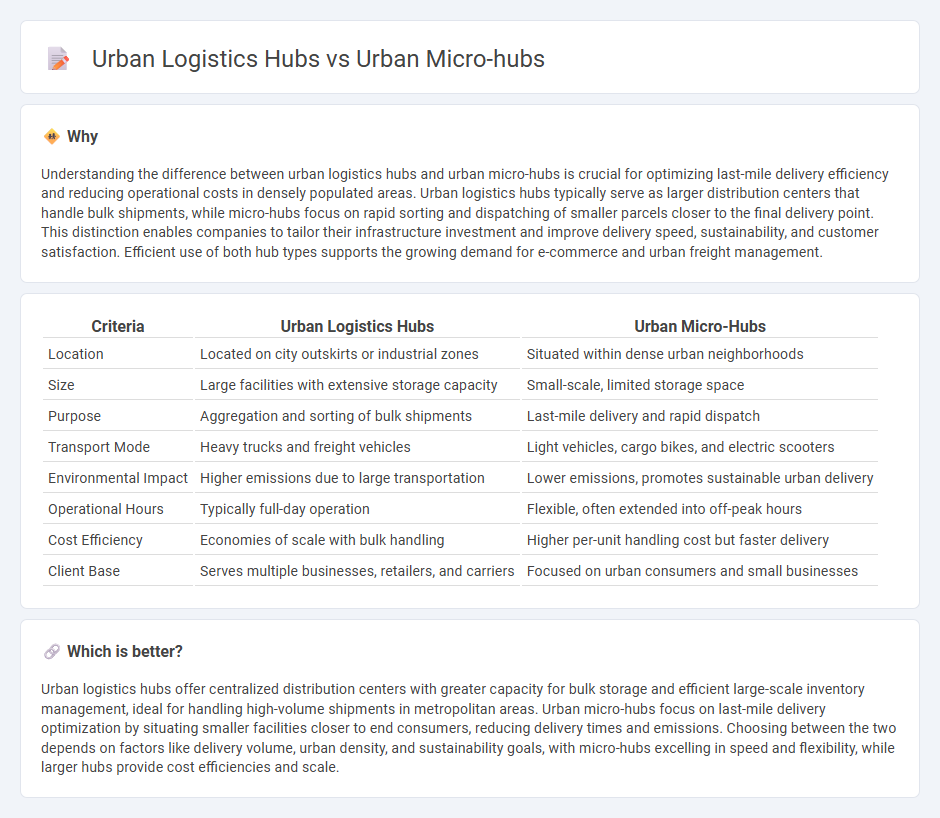
Urban logistics hubs serve as centralized distribution centers supporting efficient last-mile delivery by consolidating goods for entire city areas, enhancing supply chain management and reducing transportation costs. Urban micro-hubs operate on a smaller scale within neighborhoods, prioritizing rapid parcel sorting and local deliveries, often using environmentally friendly vehicles to minimize emissions. Explore deeper insights into how these two models transform urban freight and sustainability.
Why it is important
Understanding the difference between urban logistics hubs and urban micro-hubs is crucial for optimizing last-mile delivery efficiency and reducing operational costs in densely populated areas. Urban logistics hubs typically serve as larger distribution centers that handle bulk shipments, while micro-hubs focus on rapid sorting and dispatching of smaller parcels closer to the final delivery point. This distinction enables companies to tailor their infrastructure investment and improve delivery speed, sustainability, and customer satisfaction. Efficient use of both hub types supports the growing demand for e-commerce and urban freight management.
Comparison Table
| Criteria | Urban Logistics Hubs | Urban Micro-Hubs |
|---|---|---|
| Location | Located on city outskirts or industrial zones | Situated within dense urban neighborhoods |
| Size | Large facilities with extensive storage capacity | Small-scale, limited storage space |
| Purpose | Aggregation and sorting of bulk shipments | Last-mile delivery and rapid dispatch |
| Transport Mode | Heavy trucks and freight vehicles | Light vehicles, cargo bikes, and electric scooters |
| Environmental Impact | Higher emissions due to large transportation | Lower emissions, promotes sustainable urban delivery |
| Operational Hours | Typically full-day operation | Flexible, often extended into off-peak hours |
| Cost Efficiency | Economies of scale with bulk handling | Higher per-unit handling cost but faster delivery |
| Client Base | Serves multiple businesses, retailers, and carriers | Focused on urban consumers and small businesses |
Which is better?
Urban logistics hubs offer centralized distribution centers with greater capacity for bulk storage and efficient large-scale inventory management, ideal for handling high-volume shipments in metropolitan areas. Urban micro-hubs focus on last-mile delivery optimization by situating smaller facilities closer to end consumers, reducing delivery times and emissions. Choosing between the two depends on factors like delivery volume, urban density, and sustainability goals, with micro-hubs excelling in speed and flexibility, while larger hubs provide cost efficiencies and scale.
Connection
Urban logistics hubs serve as central nodes that consolidate and distribute goods within city environments, optimizing last-mile delivery efficiency. Urban micro-hubs function as smaller, localized offshoots of these main hubs, strategically positioned to facilitate rapid, environmentally friendly parcel transfers to consumers. Together, these interconnected systems reduce traffic congestion and carbon emissions by enabling seamless, scalable logistics solutions tailored to urban density and demand.
Key Terms
Proximity
Urban micro-hubs are small-scale, localized facilities designed to streamline last-mile delivery within tight proximity to dense urban areas, optimizing speed and reducing environmental impact. In contrast, urban logistics hubs operate at a larger scale, serving as central nodes for sorting and distributing goods across broader metropolitan regions, often positioned strategically on city outskirts to balance accessibility and space for operations. Explore the critical role of proximity in shaping the efficiency and sustainability of urban micro-hubs versus urban logistics hubs.
Consolidation
Urban micro-hubs optimize last-mile delivery by consolidating parcels into smaller, localized centers, reducing delivery times and vehicle emissions in dense city areas. Urban logistics hubs serve as larger, multimodal nodes that aggregate goods on a broader scale, enabling efficient bulk consolidation and distribution across metropolitan regions. Explore how consolidation strategies in these hubs improve urban supply chain efficiency and sustainability.
Last-mile delivery
Urban micro-hubs are small-scale, strategically located logistics points designed to facilitate efficient last-mile delivery by minimizing travel distance and time within dense city areas. In contrast, urban logistics hubs serve as larger distribution centers that consolidate deliveries but may involve longer transit times for last-mile drop-offs. Explore how optimizing these hubs revolutionizes urban last-mile delivery efficiency and sustainability.
Source and External Links
Micro-Hubs: The Future of Sustainable City Logistics - Fernhay - Urban micro-hubs are small-scale, decentralized distribution centers within cities that enhance last-mile delivery by enabling eco-friendly transport methods like electric bikes, reducing emissions, congestion, and delivery times compared to traditional warehouses on city outskirts.
Urban Micro-Hubs: Revolutionizing Last-Mile Delivery - Fernhay - Urban micro-hubs improve logistics by reducing delivery distances, minimizing environmental impact through green transport, cutting costs, and adapting to low-emission zones, thereby making last-mile delivery more efficient and sustainable in dense city areas.
Exploring the future of microhubs in last-mile logistics - Microhubs are small urban distribution points often integrated creatively in city spaces like transport stations or shopping centers, fostering collaboration among delivery stakeholders to reduce trips, improve vehicle utilization, and support greener, safer, and more efficient urban freight management.
 dowidth.com
dowidth.com